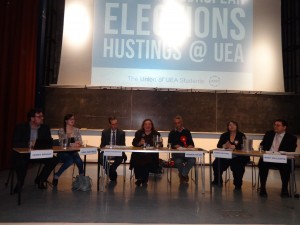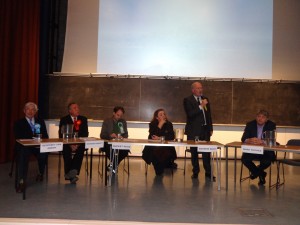Dr. Vassiliki N. Koutrakou argues that the rise of the radical right in Europe threatens to undo 55 years-worth of European integration which has brought to the European continent unprecedented peace and prosperity.
Voter apathy across Europe has been increasing over the past decades, particularly in local and European elections. What voting does occur, is to a high degree seen as a protest vote against national governments’ domestic policies. In European elections in particular, the conviction that the only directly democratically elected EU body, the European Parliament, actually has limited powers vis-à-vis the strong decision-making powers of the Council and the indirect but strong influencing power of the European Commission, coupled with the sense of “remoteness of Brussels” and lack of understanding of the relevance EU affairs have in people’s daily lives, leads people to “glaze over” and care little about turning up to vote.

Voter apathy has often, however, given way to a more sinister manifestation of electorate reaction in the run-up to the impending European elections. The convergence of enlargement fatigue, particularly since the 2004-2007 accession of 12 new member-states and its perceived excessive cost and rise in immigration, with the impact of the recent financial crisis which has exacerbated hardship, conflict, and nationalist tensions, led extremist political movements, which traditionally inhabited the margins of established political spectrums to feed monstrously upon the billowing discontent and reach unthinkable poll figures. The spectrum is broad, ranging from mostly ultra-right wing political parties feigning respectability while thinly disguising racist and/or fascist undercurrents, to left-wing pretenders, opportunistically grasping at popular disquiet and disillusionment in middle of the road politicians and the ability of the EU to provide satisfactory solutions.
These parties have no real common ground, scarcely share agendas or alliances; indeed they view each other as somewhat sinister and generally choose to distance themselves from one another. What they have in common is that they are anti-EU, in different ways, and to different extents, advocating their respective country’s exit, from the EU, or in some cases just the eurozone, riding into town on a wave of blinkered and irresponsible anti-immigration rhetoric, and demonstrating a total lack of coherent alternative “day after” programmes. From Geert Wilders to Beppe Grillo, from Marine LePen to Nigel Farage, and from Alexis Tsipras to Timo Soini, these silver-tongued demagogues are garnering support, capitalising on one of Europe’s deepest economic crises since the two World Wars, sowing divisions and, with the help of obliging populist media, promoting hateful caricatures and stereotypes: the lazy Greeks, the nazi Germans, the corrupt Italians… In the south of Europe, resentment has been growing against the rich north which subjugates and inflicts unbearable austerity in return for what is portrayed as meagre help, rendering the image of the EU as the domineering oppressor, where the club of the rich and powerful imposes its will and resistance is futile. In the north, many people feel resentful of what they perceive as having to share their hard-earned livelihoods to bail out the deceitful, ungrateful southerners and this leads to a backlash against the whole EU family idea which is seen as forever institutionally draining their resources to prop up the undeserving poor.

It is a godsend of an opportunity that populist anti-EU parties dared never hope for so they enthusiastically fuel these fears and spread bile in the pursuit of votes. This propaganda threatens to undo over 55 years-worth of European integration which has brought to the European continent unprecedented peace and prosperity. Yes, EU structures and policies require constant reassessment, re-evaluation and reform. Yes, the handling of the economic crisis has involved much trial and error and yes, the EU institutions have often got things wrong. However, even in the middle of this severe but inevitably transient economic crisis, it is worth taking a step back and recognising that, as a continent, we have never had it so good. This continent is one of the most powerful and prosperous international actors, and we have only been able to achieve this by working together, albeit quite often two steps forward and one step back.
It is perhaps harsh and unfair to expect individual voters who are struggling with wage or pension cuts, redundancy, heavy taxes, losing their savings or their homes, to take the long view and prioritise the lessons from history. However, lessons from history must not be forgotten. After all, it was popular hardship and resentment during the Weimar Republic in Germany which led to the rise of right and left extremist parties and to Adolf Hitler to being democratically elected!
Can Europeans, for the sake of short-term venting and punishing the establishment, afford to give up on the European dream?
Dr. Vassiliki N. Koutrakou is a Lecturer at the University of East Anglia and Director of CREST (the Centre for Research in European Studies).
Image credit: Eirkiletian





